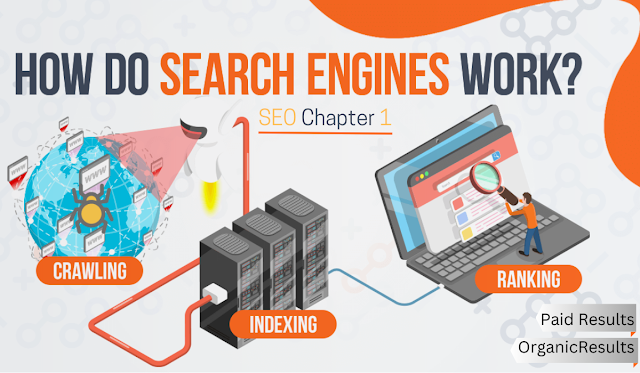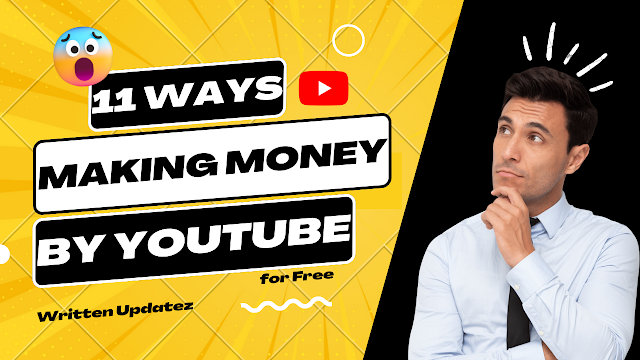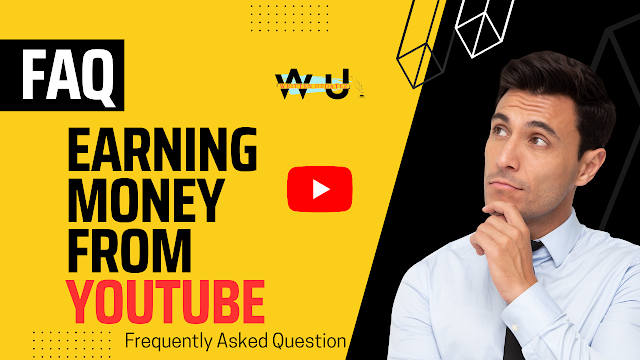How Search Engines Work ? Crawling, Indexing & then Ranking in Search Engines. How Search Engines Work & SEO helps to get high rank ? SEO Guide Series Chapter 1 2023
In this article, you can learn the first chapter of the SEO series in which we discuss that How Search Engines Work ? We divided this chapter into 4 topics.
In the 1st topic
You can learn the basics of search engines, what are search engines ? What is its aim ?, how it makes money & much more.
What are Search Engines ?
Search engines are websites that help you find information on the Internet. You type in what you want to know, and the search engine finds websites that contain that information. It scans a lot of websites really fast and shows you a list of the best websites. The most popular search engines are Google, Bing, Yahoo!, and DuckDuckGo.
Search Index and Search Algorithm are the two important components of a search engine
Find the index.
A search index is a database of information about websites on the Internet. This helps search engines find relevant web pages faster when someone searches for something.
Find the algorithm.
A search algorithm is a program that finds the most relevant websites for your search. It considers factors such as your search terms, website popularity, and content relevance to display the best websites in search results.
How Search Engines Work ?
Search engines are really like smart assistants that help you search the Internet. They look at a lot of websites and find out what they are about, and then they memorise all that information in their big brains (databases).
When you type in a question or topic, the search engine uses its big brain to find websites that are most likely to have the information you want. It then shows you a list of those websites, with the most helpful listed.
What’s the Aim of Search Engines Algorithms?
The purpose of search engines is to help people find information quickly and easily on the Internet. They do this by collecting and organizing information from websites, and then using special programs to match people's search terms to the best websites for their needs. The goal is to make it easy for people to find what they're looking for and have a great search experience.
How does it's Make Money ?
Search engines make money primarily from advertising, such as sponsored results that appear when you search for something. They also offer other types of advertising and payment services to businesses.
Advertisements are the primary source of revenue for search engines, as they provide a way for businesses to reach people who are looking for their products or services.
Paid Results are ads that advertisers pay for, market as "sponsored" or "advertised" on a search engine's results page.
Organic Results are general search results generated by search engine algorithms, which match the content of a web page to a search query.
In the 2nd topic
You can learn crawling, indexing, ranking, processing, rendering & much more which you need to know if you are in the SEO series.
Building of Indexes by Search Engines
Search engines build their indexes by sending programs called "web crawlers" to gather information about websites. These crawlers start with a list of web addresses and then follow links from those pages to other pages, essentially creating a web of interconnected pages.
Each search engine has its own search index building process. Below is a simplified version of the process used by Google.
URLs
Everything starts with a known list of URLs. Google discovers them in several ways, but the three most common are:
From backlinks: Google indexes hundreds of billions of web pages. If someone links to a new page from a well-known page, Google can find it there.
From site maps: Sitemaps tell Google which pages and files are important on your site.
From URL submissions: Google allows site owners to request crawling of individual URLs in Google Search Console.
Crawling
When a search engine sends automated software (called crawlers or spiders) to find and scan web pages on the Internet.
Indexing
After a search engine crawls a web page, it stores a copy of the page and its information in its database, so it can quickly retrieve it when someone finds it.
Ranking
When someone performs a search, the search engine uses algorithms to determine which pages in its database are most relevant to the search query and displays them in order of relevance. (i.e. classification).
Processing
When a search engine crawls and indexes a web page, it analyzes information gathered from the web page, such as text, images, and links. It then processes this information to determine how relevant it is to various search queries.
Rendering
Once processing is complete, the search engine displays the information in a search engine results page, which contains the title of the web page, a brief description of the content, and a link to the page. The search engine may also add relevant images or videos to the results page. This process is called rendering.
In the 3rd topic
You can learn how search engines rank pages in higher, what its other requirements are like: backlinks, freshness, page-speed, Mobile-friendliness & much more that you need to know.
How do search engines rank pages ?
Search engines rank pages based on various factors, such as relevance, authority, and user experience. They use complex algorithms to analyze and compare the content of web pages to determine which are most relevant to a given search query.
The search engine then ranks these pages based on their relevance and authority, as well as other factors such as user engagement and backlinks. The goal is to provide the most useful and accurate results to the user.
Backlinks
Backlinks are links from one website page to another website. They are one of Google's strongest ranking factors. This is probably why we saw a strong correlation between domain linking and organic traffic in our study of over a billion pages.
Relevance or Compatibility
Relevance is the usefulness of a given result to a search engine. Google has several ways to determine this. At the most basic level, it looks for pages that contain the same keywords as the search query. It also analyzes interaction data to determine whether others found the result useful.
Freshness
Freshness is a question-dependent ranking factor. This is more robust for searches that require new results. That's why you see a recently posted top result for "new Netflix series," but not "how to solve a Rubik's cube."
Page Speed
Page speed is a ranking factor on both desktop and mobile. But this is more of a negative rating factor than a positive one. This is because it negatively affects slow pages rather than positively affecting very fast pages.
Mobile-Friendliness Adaptation
Mobile-friendliness has been a ranking factor on mobile and desktop since Google switched to mobile-first indexing in 2019.
In the 4th topic
You can learn how search engines personalize their results. Location, Language, Search History & more which is important to know for you.
How do Search Engines Personalize Results ?
Search engines use various techniques to personalize search results based on each user's search history, location and other factors. Personalization helps search engines deliver more relevant and useful results to users. Some common ways to personalize search engine results are:
Search History
Search engines track your search history and use it to personalize their search results. For example, if you've searched for a lot of recipes in the past, the search engine may show you recipe sites at the top of your results when you search for "dinner ideas."
Location
Search engines can also use your location to personalize your results. For example, if you search for "coffee shops," the search engine may show you results that are close to your current location.
Language & Device Preferences
Search engines may also personalize results based on the user's language and device preferences. For example, if a user prefers to browse in a certain language or on a certain type of device, the search engine may show search results that are optimized for that language or device.
Social Media
Search engines can also use your social media activity to personalize your results. For example, if you've liked a lot of posts about hiking on Facebook, a search engine might show you hiking trails near you when you search for "outdoor activities."
Click-through Behavior
Search engines can also use your click-through behavior to personalize your results. For example, if you have clicked on many news articles in the past, the search engine may show you more news when you search for "current events."
What happens when a search is performed?
Have you ever wondered what goes on behind the scenes when you type a query into a search engine? How does a search engine know which results to display, and in what order? Here's a step-by-step guide to what happens when you search.
Location – Some search queries are location dependent such as 'cafes near me' or 'movie times'.
Language Detected - Search engines will return results in the user's language, if it can be detected.
Previous Search History – Search engines will return different results for a query depending on what the user has searched for previously.
Device - A different set of results may be returned based on the device that was queried.
Closing Words
I hope you learn a lot in this article and enjoy your SEO series. This is how search engines work and more about its working method. It's important to note that while personalization can be helpful, it can also limit your exposure to new information and perspectives. If you're concerned about this, you can use a private browsing mode or clear your search history to see more diverse results.








